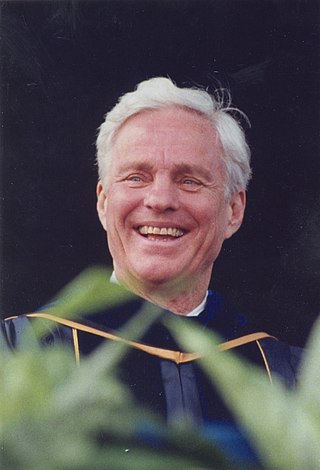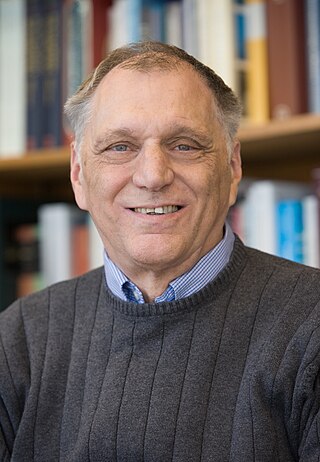
Reed College is a private liberal arts college in Portland, Oregon, United States. Founded in 1908, Reed is a residential college with a campus in the Eastmoreland neighborhood, Tudor-Gothic style architecture, and a forested canyon nature preserve at its center.

James McKeen Cattell was the first professor of psychology in the United States, teaching at the University of Pennsylvania in Philadelphia. He was a long-time editor and publisher of scientific journals and publications, including Science, and served on the board of trustees for Science Service, now known as Society for Science & the Public from 1921 to 1944.
Steven Peter Russell Rose is an English neuroscientist, author, and social commentator. He is an emeritus professor of biology and neurobiology at the Open University and Gresham College, London.

Richard Chatham Atkinson is an American professor of psychology and cognitive science and an academic administrator. He is president emeritus of the University of California system, former chancellor of the University of California, San Diego, and former director of the National Science Foundation.
Endel Tulving was an Estonian-born Canadian experimental psychologist and cognitive neuroscientist. In his research on human memory he proposed the distinction between semantic and episodic memory. Tulving was a professor at the University of Toronto. He joined the Rotman Research Institute at Baycrest Health Sciences in 1992 as the first Anne and Max Tanenbaum Chair in Cognitive Neuroscience and remained there until his retirement in 2010. In 2006, he was named an Officer of the Order of Canada (OC), Canada's highest civilian honour.

Pierre Marie Félix Janet was a pioneering French psychologist, physician, philosopher, and psychotherapist in the field of dissociation and traumatic memory.
Gísli Hannes Guðjónsson, CBE is an Icelandic-British academic, educator, forensic psychologist and former detective. He is Emeritus Professor at the Institute of Psychiatry of King's College London and a Professor in the Psychology Department at Reykjavik University. Gísli is an internationally renowned authority on suggestibility and false confessions and is one of the world's leading experts on false memory syndrome.

Barry Schwartz is an American psychologist. Schwartz is the Dorwin Cartwright Emeritus Professor of Social Theory and Social Action at Swarthmore College and since 2016 has been visiting professor at the University of California, Berkeley. His work focuses on the intersection of psychology and economics. He frequently publishes editorials in The New York Times, applying his research in psychology to current events. Schwartz's research addresses morality, decision-making and the inter-relationships between behavioral science and society. His books criticize certain philosophical roots of Western societies and expose underlying myths common in both lay and academic psychological theories. In particular, he is a critic of the "rational economic man" model in both psychology and economics. Schwartz studied under David Richmond Williams for his PhD at the University of Pennsylvania where he was a predoctoral fellow with National Science Foundation.

Alan David Baddeley CBE FRS is a British psychologist. He is known for his research on memory and for developing the three-component model of working memory. He is a professor of psychology at the University of York.
Marcia K. Johnson is a Sterling Professor emeritus of Psychology at Yale University. She was born in 1943 in Alameda, California. Johnson attended public schools in Oakland and Ventura. She attended the University of California, Berkeley where she received both her B.A. in psychology (1965) and Ph.D. in experimental psychology (1971). In 1970 Johnson moved to Long Island, New York to take a faculty position at The State University of New York at Stony Brook, where she worked until 1985. She then accepted a position at Princeton University and was there from 1985 to 2000. Johnson became Sterling Professor of Psychology at Yale University in 2000.
Fergus Ian Muirden Craik FRS is a cognitive psychologist known for his research on levels of processing in memory. This work was done in collaboration with Robert Lockhart at the University of Toronto in 1972 and continued with another collaborative effort with Endel Tulving in 1975. Craik has received numerous awards and is considered a leader in the area of memory, attention and cognitive aging. Moreover, his work over the years can be seen in developmental psychology, aging and memory, and the neuropsychology of memory.
Barry John Everitt, is a British neuroscientist and academic. He was Master of Downing College, Cambridge (2003–2013), and Professor of Behavioural Neuroscience at the University of Cambridge (1997–2013). He is now emeritus professor and Director of Research. From 2013 to 2022, he was provost of the Gates Cambridge Trust at Cambridge University.
Richard Shiffrin is an American psychologist, professor of cognitive science in the Department of Psychological and Brain Sciences at Indiana University, Bloomington. Shiffrin has contributed a number of theories of attention and memory to the field of psychology. He co-authored the Atkinson–Shiffrin model of memory in 1968 with Richard Atkinson, who was his academic adviser at the time. In 1977, he published a theory of attention with Walter Schneider. With Jeroen G.W. Raaijmakers in 1980, Shiffrin published the Search of Associative Memory (SAM) model, which has served as the standard model of recall for cognitive psychologists well into the 2000s. He extended the SAM model with the Retrieving Effectively From Memory (REM) model in 1997 with Mark Steyvers.
Lila Ruth Gleitman was an American professor of psychology and linguistics at the University of Pennsylvania. She was an internationally renowned expert on language acquisition and developmental psycholinguistics, focusing on children's learning of their first language.
Henry Gleitman was a professor of psychology at the University of Pennsylvania.
Saul Sternberg is a professor emeritus of psychology and former Paul C. Williams Term Professor (1993–1998) at the University of Pennsylvania. He is a pioneer in the field of cognitive psychology in the development of experimental techniques to study human information processing. Sternberg received a B.A. in mathematics in 1954 from Swarthmore College and a PhD in social psychology from Harvard University in 1959. He completed a postdoctoral fellowship in mathematical statistics at the University of Cambridge in 1960, and he subsequently worked as a research scientist in the linguistics and artificial intelligence research department at Bell Laboratories, where he continued to work as a member of the technical staff for over twenty years. Sternberg's first academic position was at the University of Pennsylvania, where he was employed from 1961–1964, and where he has remained since 1985. He has also served as a visiting professor at University College, London, the University of California, Berkeley, and Rutgers University. The impact of Sternberg's theoretical and empirical contributions to the field of cognitive psychology have been recognized by many organizations, and he has been elected to fellowship in the American Psychological Association, the Association for Psychological Science, the Society of Experimental Psychologists, the American Association for the Advancement of Science, and the National Academy of Sciences.

Larry Ryan Squire is a professor of psychiatry, neurosciences, and psychology at the University of California, San Diego, and a Senior Research Career Scientist at the Veterans Affairs Medical Center, San Diego. He is a leading investigator of the neurological bases of memory, which he studies using animal models and human patients with memory impairment.
D. Stephen Lindsay is a cognitive psychologist in the field of memory, and a professor of psychology at the University of Victoria (UVic), British Columbia. He received his PhD from Princeton University in 1987.

Mahlon Brewster Smith was an American psychologist and past president of the American Psychological Association. His career included faculty appointments at Vassar College, New York University, University of California, Berkeley, University of Chicago and University of California, Santa Cruz. Smith had been briefly involved with the Young Communist League as a student at Reed College in the 1930s, which resulted in a subpoena by the U.S. Senate in the 1950s. That activity caused him to be blacklisted by the National Institute of Mental Health for ten years without his knowledge.
Richard Frederick Thompson was an American behavioral neuroscientist. He was the William M. Keck Professor of Psychology and Biological Sciences at the University of Southern California, with a parallel appointment as professor of neurology. Thompson was known for his work on learning and memory. His graduate student, David A. McCormick discovered that the cerebellum was critical in learning and performance in classical conditioning. During his career, he served as editor-in-chief of the scientific journals Physiological Psychology, Journal of Comparative and Physiological Psychology, and Behavioral Neuroscience.







